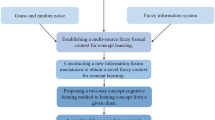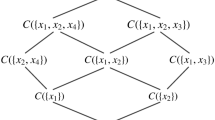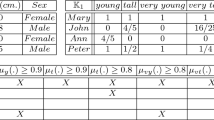Abstract
As a new interdisciplinary field induced by formal concept analysis, rough set, granular computing and cognitive computing, cognitive concept learning has received a great attention in recent years. Cognitive concept learning refers to the acquisition of specific concepts through specific cognitive concept learning approaches. The processes of concept learning mainly focus on simulating human brain recognizing concepts through the modeling of brain intelligence. In this paper, we investigate the mechanism of multi-level cognitive concept learning method oriented to data sets with fuzziness by discussing the process of human cognition. Through a newly defined fuzzy focal feature set, we put forward a corresponding structure of feature-oriented multi-level cognitive concept learning method in data sets with fuzziness from a perspective of philosophical and psychological views of human cognition. To make the presented cognitive concept learning approach much easier to understand and to apply it to practice widely, we establish an algorithm to recognize fuzzy concepts and incomplete fuzzy concepts. In addition, we present a case study about how to recognize and distinguish any two different micro-expressions from an information system with quantitative description to use our proposed method and theory to solve conceptual cognition problems, and also we perform an experimental evaluation on five data sets downloaded from the University of California-Irvine databases. Compared with the existing granular computing approach to two-way learning, we obtain more concepts than the two-way learning approach, which shows the feasibility and effectiveness of our feature-oriented multi-level cognitive learning method in data sets with fuzziness.




Similar content being viewed by others
References
Bargiela A, Pedrycz W (2006) The roots of granular computing. In: IEEE International conference on granular computing, pp 806–809
Belohlávek R, Baets BD, Outrata J, Vychodil V (2009) Inducing decision trees via concept lattices. Int J Gen Syst 38(4):455–467
Duntsch N, Gediga G (2002) Modal-style operators in qualitative data analysis. In: IEEE international conference on data mining, pp 155–162
Ganter B, Wille R (2012) Formal concept analysis: mathematical foundations. Springer, Berlin
Huang CC, Li JH, Mei CL, Wu WZ (2017) Three-way concept learning based on cognitive operators: an information fusion viewpoint. Int J Approx Reason 83:218–242
Konecny J (2017) On attribute reduction in concept lattices: methods based on discernibility matrix are outperformed by basic clarification and reduction. Inf Sci 415:199–212
Kosko B (1986) Fuzzy cognitive maps. Int J Man–Mach Stud 24(1):65–75
Kumar CA, Ishwarya MS, Loo CK (2015) Formal concept analysis approach to cognitive functionalities of bidirectional associative memory. Biol Inspired Cogn Archit 12:20–33
Li JH, Mei CL, Lv YJ (2012) Knowledge reduction in real decision formal contexts. Inf Sci 189:191–207
Li JH, Mei CL, Lv YJ (2013) Incomplete decision contexts: approximate concept construction, rule acquisition and knowledge reduction. Int J Approx Reason 54(1):149–165
Li JH, Mei CL, Xu WH, Qian YH (2015) Concept learning via granular computing: a cognitive viewpoint. Inf Sci 298:447–467
Li JH, Ren Y, Mei CL, Qian YH, Yang XB (2016) A comparative study of multigranulation rough sets and concept lattices via rule acquisition. Knowl-Based Syst 91:152–164
Li JH, Huang CC, Qi JJ, Qian YH, Liu WQ (2017) Three-way cognitive concept learning via multi-granularity. Inf Sci 378:244–263
Liu M, Shao MW, Zhang WX, Wu C (2007) Reduction method for concept lattices based on rough set theory and its application. Comput Math Appl 53(9):1390–1410
Luksch P, Wille R (1991) A mathematical model for conceptual knowledge systems. Classification, data analysis, and knowledge organization. Springer, Berlin, pp 156–162
Modha DS, Ananthanarayanan R, Esser SK, Ndirango A, Sherbondy AJ, Singh R (2011) Cognitive computing. Commun ACM 54(8):62–71
Moreton E, Pater J, Pertsova K (2017) Phonological concept learning. Cogn Sci 41(1):4–69
Pedrycz W, Skowron A, Kreinovich V (2008) Handbook of granular computing. Wiley, New York
Pei D, Mi JS (2011) Attribute reduction in decision formal context based on homomorphism. Int J Mach Learn Cybern 2(4):289–293
Qi JJ, Wei L, Yao YY (2014) Three-way formal concept analysis. In: International conference on rough sets and knowledge technology. Springer, Cham, pp 732–741
Qi JJ, Qian T, Wei L (2015) The connections between three-way and classical concept lattices. Knowl-Based Syst 91:143–151
Rodríguez-Jiménez JM, Cordero P, Enciso M, Rudolph S (2016) Concept lattices with negative information: a characterization theorem. Inf Sci 369:51–62
Salmeron JL (2010) Modelling grey uncertainty with fuzzy grey cognitive maps. Expert Syst Appl 37(12):7581–7588
Shivhare R, Cherukuri AK (2017) Three-way conceptual approach for cognitive memory functionalities. Int J Mach Learn Cybern 8(1):21–34
Shivhare R, Cherukuri AK, Li JH (2017) Establishment of cognitive relations based on cognitive informatics. Cogn Comput 9(5):721–729
Singh PK (2017) Three-way fuzzy concept lattice representation using neutrosophic set. Int J Mach Learn Cybern 8(1):69–79
Singh PK (2018a) \(m\)-polar fuzzy graph representation of concept lattice. Eng Appl Artif Intell 67:52–62
Singh PK (2018b) Concept learning using vague concept lattice. Neural Process Lett 48(1):31–52
Singh PK (2018c) Concept lattice visualization of data with \(m\)-polar fuzzy attribute. Granul Comput 3(2):123–137
Singh PK (2018d) Medical diagnoses using three-way fuzzy concept lattice and their Euclidean distance. Comput Appl Math 37(3):3283–3306
Singh PK (2018e) Three-way \(n\)-valued neutrosophic concept lattice at different granulation. Int J Mach Learn Cybern 9(11):1839–1855
Singh PK (2019) Bipolar fuzzy concept learning using next neighbor and Euclidean distance. Soft Comput 23(12):4503–4520
Singh PK, Kumar AC (2014) A note on bipolar fuzzy graph representation of concept lattice. Int J Comput Sci Math 5(4):381–393
Singh PK, Kumar CA (2014) Bipolar fuzzy graph representation of concept lattice. Inf Sci 288:437–448
Wang Y (2008) On concept algebra: a denotational mathematical structure for knowledge and software modeling. Int J Cogn Inform Nat Intell 2(2):1–19
Wang Y (2009) On cognitive computing. Int J Softw Sci Comput Intell 1(3):1–15
Wang Y, Chiew V (2010) On the cognitive process of human problem solving. Cogn Syst Res 11(1):81–92
Wang H, Zhang WX (2008) Approaches to knowledge reduction in generalized consistent decision formal context. Math Comput Modell 48(11–12):1677–1684
Wang Y, Zadeh LA, Yao YY (2012) On the system algebra foundations for granular computing. Software and intelligent sciences: new transdisciplinary findings. IGI Global, Hershey, pp 98–121
Wille R (1992) Concept lattices and conceptual knowledge systems. Comput Math Appl 23(6–9):493–515
Wille R (2009) Restructuring lattice theory: an approach based on hierarchies of concepts. In: International conference on formal concept analysis. Springer, Berlin, pp 314–339
Wu WZ, Leung Y, Mi JS (2009) Granular computing and knowledge reduction in formal contexts. IEEE Trans Knowl Data Eng 21(10):1461–1474
Xu WH, Li WT (2016) Granular computing approach to two-way learning based on formal concept analysis in fuzzy datasets. IEEE Trans Cybern 46(2):366–379
Xu WH, Pang JZ, Luo SQ (2014) A novel cognitive system model and approach to transformation of information granules. Int J Approx Reason 55(3):853–866
Yao YY (2001) On modeling data mining with granular computing. In: IEEE international conference on computer software and applications, pp 638–643
Yao YY (2004) A comparative study of formal concept analysis and rough set theory in data analysis. In: International conference on rough sets and current trends in computing. Springer, Berlin, pp 59–68
Yao YY (2004) Concept lattices in rough set theory. In: IEEE annual meeting of the fuzzy information, vol 2, pp 796–801
Yao YY (2009) Interpreting concept learning in cognitive informatics and granular computing. IEEE Trans Syst Man Cybern, Part B (Cybern) 39(4):855–866
Zadeh LA (1965) Information and control. Fuzzy Sets 8(3):338–353
Zhao YX, Li JH, Liu WQ, Xu WH (2017) Cognitive concept learning from incomplete information. Int J Mach Learn Cybern 8(1):159–170
Acknowledgements
This work is supported by the Macau Science and Technology Development Fund (No. 081/2015/A3), the National Natural Science Foundation of China (Nos. 71471060, 61472463, 61402064, and 61772002), the Science and Technology Research Program of Chongqing Municipal Education Commission (Grant No. KJ1709221).
Author information
Authors and Affiliations
Corresponding author
Ethics declarations
Conflict of interest
The authors declare that they have no conflict of interest.
Ethical approval
This article does not contain any studies with human participants or animals performed by any of the authors.
Informed consent
Informed consent was obtained from all individual participants included in the study.
Additional information
Communicated by V. Loia.
Publisher's Note
Springer Nature remains neutral with regard to jurisdictional claims in published maps and institutional affiliations.
Rights and permissions
About this article
Cite this article
Tsang, E.C.C., Fan, B., Chen, D. et al. Multi-level cognitive concept learning method oriented to data sets with fuzziness: a perspective from features. Soft Comput 24, 3753–3770 (2020). https://doi.org/10.1007/s00500-019-04144-7
Published:
Issue Date:
DOI: https://doi.org/10.1007/s00500-019-04144-7




